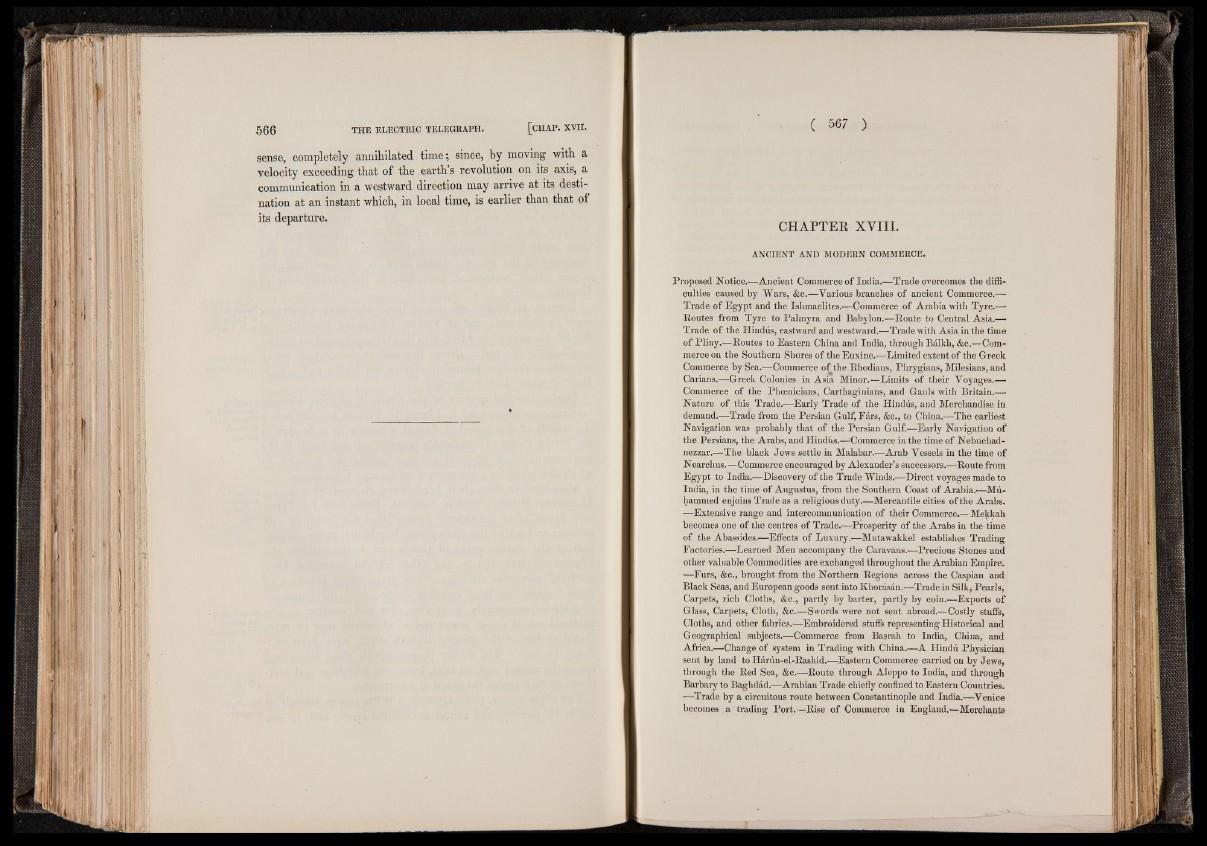
sense, completely annihilated time; since, by moving with a
velocity exceeding that of the earth’s revolution on its axis, a
communication in a westward direction may arrive at its destination
at an instant which, in local time, is earlier than that of
its departure.
CHAPTER X V III.
ANCIENT AND MODERN COMMERCE.
Proposed Notice.—Ancient Commerce of India.—Trade overcomes the difficulties
caused by Wars, &c.—Various branches of ancient Commerce.—■
Trade of E gypt and the Islimaelites.—Commerce of Arabia with Tyre.—-
Routes from Tyre to Palmyra and Babylon.—Route to Central Asia.—
Trade of the Hindus, eastward and westward.—Trade with Asia in the time
of Pliny.—Routes to Eastern China and India, through Balkh, &c.—Commerce
on the Southern Shores of the Euxine.—Limited extent of the Greek
Commerce by Sea.—Commerce of the Rhodians, Phrygians, Milesians, and
Carians.—Greek Colonies in Asia Minor.—Limits of their Voyages.—
Commerce of the Phoenicians, Carthaginians, and Gauls with Britain.—
Nature of this Trade.-—Early Trade of the Hindus, and Merchandise in
demand.—Trade from the Persian Gulf, Fars, &c., to China.—The earliest
Navigation was probably that of the Persian Gulf.—Early Navigation of
the Persians, the Arabs, and Hindus.—-Commerce in the time of Nebuchadnezzar.—
The black Jews settle in Malabar.—Arab Vessels in the time of
Nearchus.—Commerce encouraged by Alexander’s successors.—Route from
Egypt to India.—Discovery of the Trade Winds.—Direct voyages made to
India, in the time of Augustus, from the Southern Coast of Arabia.—Mu-
hammed enjoins Trade as a religious duty.—Mercantile cities of the Arabs.
—Extensive range and intercommunication of their Commerce.—Mekkah
becomes one of the centres of Trade.—Prosperity of the Arabs in the time
of the Abassides.—Effects of Luxury.—Mutawakkel establishes Trading
Factories.—Learned Men accompany the Caravans.—Precious Stones and
other valuable Commodities are exchanged throughout the Arabian Empire.
—Furs, &e., brought from the Northern Regions across the Caspian and
Black Sbas, and European goods sent into Khorasan.—Trade in Silk,- Pearls,
Carpets, rich Cloths, &c., partly by barter, partly by coin.—Exports of
Glass, Carpets, Cloth, &c.—Swords were not sent abroad.—Costly stuffs,
Cloths, and other fabrics.—Embroidered stufls representing Historical and
Geographical subjects.—Commerce from Basrah to India, China, and
Africa.—Change of system in Trading with China.—A Hindu Physician
sent by land to Harun-el-Rashid.—Eastern Commerce carried on by Jews,
through the Red Sea, &c.—Route through Aleppo to India, and through
Barbary to Baghdad#?-Arabian Trade chiefly confined to Eastern Countries.
-—Trade by a circuitous route between Constantinople and India.—Venice
becomes a trading P o rt.—Rise of Commerce in England.—Merchants